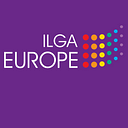5 profound lessons we learned from working with disabled LGBTI activists and organisations
Making our work more inclusive is at the core of ILGA-Europe’s purpose. This is especially true in the case of disabled LGBTI people, who continue to be marginalised in our movement. In this blog, we share some of our learnings from working alongside disabled LGBTI activists. If you are part of a queer rights organisation, this may be particularly useful for you!
All LGBTI people are still far from living in fully equal societies but D/deaf and disabled LGBTI people face specific barriers and challenges when accessing human rights. As human rights organisations we have to ask ourselves who are we leaving behind and make space among our priorities. Although, accessibility and inclusiveness are increasingly present in LGBTI groups’ conversations and practices, most D/deaf and disabled LGBTI people continue to be marginalised in LGBTI movements.
At ILGA-Europe, we want to contribute to changing this. For some years now, we’ve been working together with international organisations like the European Disabilities Forum, which defends the interests of over 100 million persons with disabilities in Europe. We’ve learned and readjusted our own practices regarding online and in-person events, language, social media and much more, as well as taking in these lessons in our advocacy work with EU institutions and the Council of Europe.
We’ve also learnt from the community. In 2019 we hosted a gathering of 11 of D/deaf and disabled LGBTI activists from nine countries throughout the European region who clarified their priorities with us: connecting voices, visibility, educating organisations, and the fundamental necessity for D/deaf and disabled LGBTI people to lead this work. Following this initiative, we launched a funding call aimed at developing projects that would support activism at this intersection. The high number of applications we received shows there is an important need. Have a look at what we’ve learned from this funding call, which we hope will be useful for your LGBTI activism work too:
1. Centering disabled LGBTI voices is the starting point
It should go without saying but let’s make it clear nonetheless. LGBTI people with disabilities must be placed at the centre of the work. The projects we supported were led by people who are LGBTI people living with a disability, they were the ones shaping the project as it went along and changing outputs when needed, to ensure that they are meaningful and accessible for the community. This proved essential for the success of projects.
2. Consider additional barriers D/deaf and disabled LGBTI activists face in their work
Groups led by disabled LGBTI people, especially smaller groups, very often have to cope with a lot more than the usual challenges in managing a project. Our experience of supporting projects during the COVID-19 pandemic made it very clear that groups working on the intersection of LGBTI and disability are made more vulnerable by larger inequalities and bigger changes going on in the world. This in no way means that smaller LGBTI/disability rights groups should not be funded! If it means anything, it is that groups at this intersection desperately need more funding, and tailored support that allows them to carry out their projects.
3. Flexibility, support and empathy go a long way
As a grant-maker supporting a disabled LGBTI activism project, a few small things made a significant difference in the development of projects. It mattered that we provided additional flexibility in terms of reallocating budget items, allowing plans to be changed or dropped, and extending project timelines, recognising the learning done along the way. Being explicit about the additional support we could offer and show understanding when groups met unexpected challenges reduced the stress felt by groups who haven’t had much experience in managing funded projects.
4. Financial and human resources support by larger organisations can play an important role
Larger LGBTI organisations can play an important role supporting D/deaf and disabled LGBTI activists. They have infrastructure and capacity to share and can be essential to keep the work of smaller groups going. Receiving support in project management from more resourced LGBTI organisations made a big difference for our grantees. Allocating both financial and human resources is a meaningful way to support D/deaf and disabled LGBTI groups. As long as you keep D/deaf and disabled LGBTI in the lead to shape the project and decide on outcomes!
5. This is your time to learn too!
Supporting disabled LGBTI activism is also about learning about the lived reality of D/deaf and disabled LGBTI people yourself. Think about how you design projects and activities so they lead to changes in your own organisational culture — from making your work practices and premises, your communication and events more accessible, to increasing your knowledge and resources available on disability rights issues.
Any organisation that wants to engage should commit to listening to the needs of D/deaf and disabled LGBTI people and introduce organisational changes to cater them where needed. At ILGA-Europe we are committed to continue doing our best to ensure we learn, to develop and change as we learn, and to find more ways to support D/deaf and disabled LGBTI activists and activism in Europe and Central Asia.
